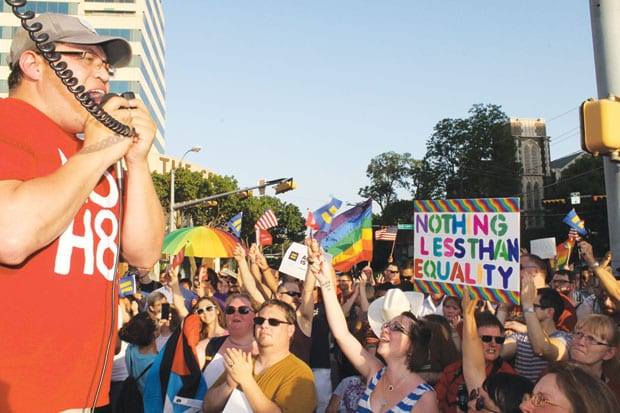
VICTORY | Omar Narvaez addresses the crowd at the Day of Decision rally at the Legacy of Love Monument on the corner of Cedar Springs Road and Oak Lawn Avenue on June 26. (Anna Waugh/Dallas Voice)
With one decision striking down parts of the Defense of Marriage Act in June, the U.S. Supreme Court brought federal recognition to millions of same-sex couples, even Texans.
The Supreme Court struck down Section 3 of the Defense of Marriage Act as unconstitutional in United States v. Windsor, requiring the federal government to recognize married same-sex couples and provide them with the full benefits of marriage they were previously denied.
However, it remained unclear how many of those benefits couples, who are legally married in other states but reside in Texas, would receive.
Although some federal benefits were given to same-sex couples in states where they live, many benefits, like military spousal benefits and joint tax filings, are allowed in any state as long as the couple is legally married. And some agencies are still analyzing how benefits will change.
But the biggest gain from DOMA’s defeat was immigration. With the federal government recognizing same-sex unions, gays could have their foreign spouses receive citizenship with marriage, ending legal battles and uniting broken families.
In addition to DOMA, the court ruled in Hollingsworth v. Perry, the challenge to the constitutionality of California’s same-sex marriage ban Proposition 8, that supporters of the amendment didn’t have standing to appeal.
The decision resulted in same-sex marriage resuming in California, but the ruling didn’t bring marriage equality to other states.
Although the odds for a sweeping Prop 8 decision were slim, some advocates still hoped the court would strike down California’s ban and all state constitutional marriage amendments as unconstitutional in the 34 states with marriage laws, including Texas.
But the rulings’ significance is not lost on the Lone Star State, as the momentum from the Supreme Court will bring marriage equality to the state in one way or another within a few years.
And even as benefits are still unclear and the tangled patchwork of state laws must work with new federal regulations, one thing is clear: equality is coming to all of America.
This article appeared in the Dallas Voice print edition December 27, 2013.

